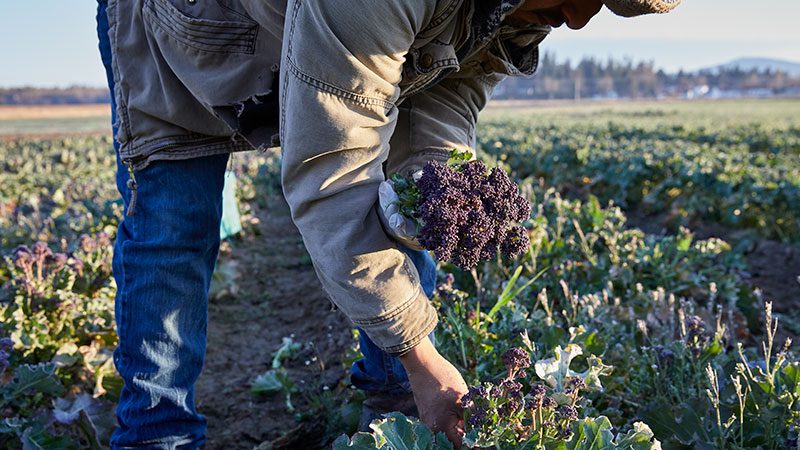Learn about PCC in the 2024 Co-op Purpose Report

In a tumultuous year, PCC doubled down on what it does best: Staying true to co-op values and prioritizing community needs.
That’s the assessment given in the 2024 Co-op Purpose Report, a data-driven annual review of co-op goals and achievements.
Initial projections had predicted financial losses for the co-op in 2024. However, despite challenges including nationwide labor shortages, supply chain disruptions, and food inflation, in the end PCC turned a modest profit (though not one substantial enough to issue dividends), the report said.
Throughout the year, PCC also made significant advances on its commitments to staff, members and shoppers, sustainability, standards and community partners.
“When you shop at PCC, you’re doing more than buying groceries; you’re actively investing in a more equitable, just and sustainable future,” CEO Krish Srinivasan said in the report.
“Every purchase is an opportunity to make a positive impact that extends far beyond the checkout counter. Those seemingly small, everyday choices add up to help shape the world we wish to see. Together, we’re making a difference, one decision and one day at a time.”
The full report is online here. Selected highlights include:
- PCC had more than 117,000 member-owners by the end of 2024, up from about 114,000 the previous year. Member benefits included special offers such as discounts and free items, representing a total value of $180 (three times the one-time fee for a lifetime PCC membership).
- The co-op posted $449.9 million in net sales for 2024, growing 3.1% year over-year, with close to two-thirds of total co-op gross sales coming from purchases by PCC members. Operating expenses for the co-op decreased 2.9% in 2024 compared to the prior year. Wages, benefits and tax expenses increased in 2024 compared to 2023, primarily driven by wage increases for all staff members, while general, administrative expenses and marketing expenses decreased.
- PCC continued to generally reduce its environmental impact and climate footprint. in 2024, the co-op reduced total waste in all categories including cardboard, compost, garbage, and general recycling. PCC also reduced greenhouse gas emissions from its biggest source, refrigerants, by installing leak detectors that allowed machines to be repaired before major leaks occurred.
- Specifically, those environmental impact figures included a 10% drop in garbage generated, to 677 tons, as well as a 5% drop in generated compost, to 1,716 tons, and a 15% drop in generated recycling, to 292 tons. (These improvements were helped with partnerships like one with Seadrunar Recycling.) What are known as “Scope 1 emissions,” representing fleet fuel (gas and diesel), natural gas (usage in stores), and refrigerant and HVAC leaks and refills, dipped 2% to 4,681 tons, while “Scope 2 emissions” representing electricity use rose 1% to 2016 tons, reflecting growth in overall sales.
- Adding to its existing product standards, PCC added a new standard in 2024 covering cleaning products. Among other requirements, the standard requires products to be ammonia-free, phosphate-free and free of phthalates (chemical compounds that make plastics more flexible and durable.)
- PCC led industry advancements supporting regenerative agriculture, including organizing a convening of farmers, tribal leaders, policy officials and producers on the topic and hosting a member-only educational event.
- In 2024, PCC contributed $571,538 to the community through partnership investment, round-up donations, product pass-through donations, in-store customer donations and PCC staff giving.
- In one example of this support, PCC members and shoppers helped raise more than $248,000 for Growing for Good, a partnership between Neighborhood Farmers Markets, Harvest Against Hunger and PCC connecting Washington’s small farms to hunger relief organizations. Whether through rounding up purchases at PCC or making direct contributions, that money has helped support 25 farms and 25 hunger relief organizations, with more than 200,000 pounds of fresh produce donated since the innovative program began in 2020.
- Other such collaborations included a partnership with United Indians of All Tribes Foundation that raised $15,000 for the organization as well as inspiring a national co-op campaign raising more than $150,000 for Native-led organizations. An in-store fundraiser for Viva Farms, a nonprofit organization training new farmers, raised $17,783, while a separate collaboration with a tote bag designed by local artist Marisol Ortega raised another $7,000. And 2024 was the first of a three-year commitment supporting the Washington State Organic & Sustainable Farming Fund (WSOSFF), managed by the Tilth Alliance, funding organic and regenerative agricultural practices that mitigate climate change.
- In the 2024 Washington legislative session, PCC and our community of advocates helped advance policies that support local farms, food security and environmental sustainability. Key wins included funding to reduce food waste and support food donations; expanded summer EBT benefits for low-income students; new restrictions on pollinator-harming pesticides; and financial support for small farms adopting climate-smart practices. We also helped secure funding to reduce the cost of organic
certification and to feed low-income seniors, though overall food security funding fell short of urgent needs.
